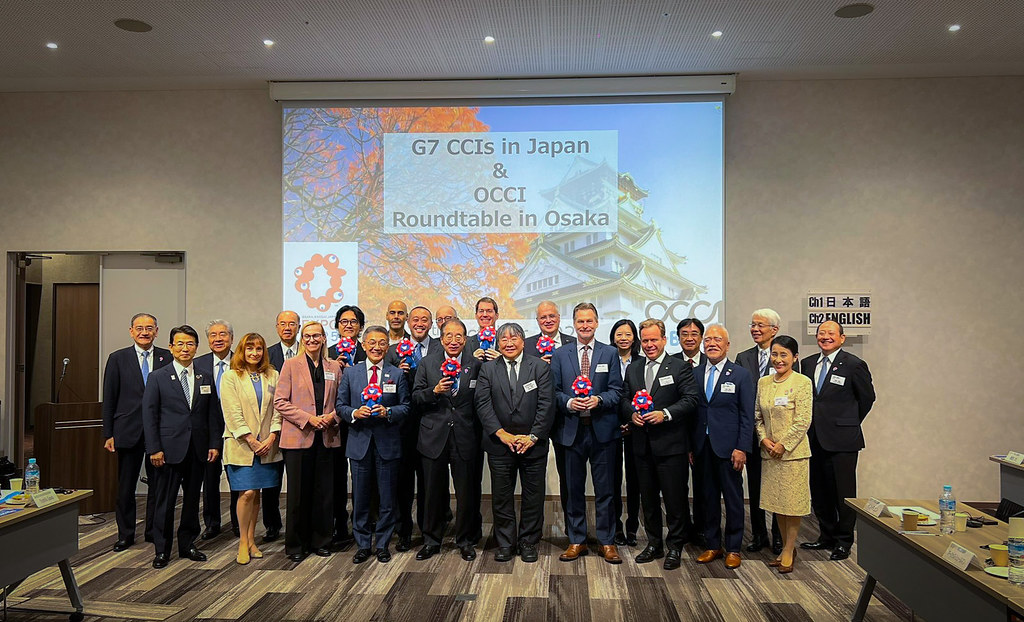Member? Please login
Tech & HR: the Good, the Bad and the Future

Written by Sterling Content
November 15, 2023
Past Event Round Ups
Tech has been changing the world of work for decades. Now, with greater advances in automation and digitalisation, as well as the adoption of artificial intelligence (AI), tech is transforming not only how people work but also what people will be needed to work on.
As HR is concerned with the recruitment, development and retention of employees, covering everything from administrative procedures to employee relations and performance management, staff in these roles are finding themselves at the forefront of this sea change. So what opportunities and challenges can people expect from the evolution of the workplace?
Experts from the worlds of tech, recruitment and HR considered answers to this question, as well as how companies can respond, during a webinar hosted by the British Chamber of Commerce in Japan in late October.
Moderator Tove Kinooka, director of Global Perspectives KK, opened the webinar by outlining why the proliferation of technology at work matters to HR: Automation could eliminate 14% of jobs and radically change 32% of other jobs globally within 15–20 years, according to the Organisation for Economic Co-operation and Development’s Employment Outlook 2019, “The Future of Work.”
Companies are taking this prediction very seriously, and “those who are proactive understand that enabling their people to deal with this transformation is a strategic imperative and a major change initiative,” she added.
Hiring and training
With greater need for both specialty tech roles and roles that require use of tech, organisations are increasingly considering how to obtain the knowledge and skills required “to harness the power of tech’s value for business,” said Tomokazu Betzold, senior director of tech and transformation at Robert Walters Japan. Organisations are choosing between reskilling staff and welcoming new hires but both pose challenges.
“The former isn’t just about training; it’s about organisational change management,” he said. Meanwhile, companies that go to the marketplace face “fierce competition to secure coveted and scarce talent in Japan.”
Moreover, once the person is hired, organisations may struggle with onboarding and management if their staff lack the technical expertise to support hires such as scrum masters, data scientists and AI engineers. “These tech profiles are now being hired into all kinds of departments, bringing new challenges.”
Such eventualities mean “everyone needs to have a digital mindset going forward,” he added.
Betzold also noted that an increasing number of people are making “dramatic shifts” in their career, for example from finance into tech, which is allowing the recruitment industry to assess candidates based on “core competencies” rather than prerequisites. Whether hiring or reskilling, organisations should therefore think about what they need in a person and then teach them the job they need them to do.
“Developing talent internally that knows your business, has expertise of what you do and learns how to apply tech to problems—that is potential for competitive advantage,” he said.
Looking further ahead, at how AI will change the nature of jobs, Betzold opined that “the difference won’t be of degree, but of kind.”
Tech companies are anticipating the change by implementing effective programmes to reskill their staff, in turn “providing a model” for other organisations to follow,” he said. But future organisational change management “will take place in a broader ecosystem” consisting of educational institutes, government, industry and business partnerships, he noted.
Utilising tech tools
Masaki Koizumi, director of corporate business development at NEC Corporation, outlined how his company is working to double staff engagement to 50% by understanding the impact of middle managers on teams.
NEC developed a causal AI tool that analyses numerous variables and “visualises the direction and strength between factors,” he explained. The award-winning tech works by generating input data, carrying out a quantitative analysis and providing interpretation, allowing staff to do qualitative interviews and verify effects.
In the case of the engagement rate, the tool found “a causal relationship between how sub-ordinates perceive autonomy, psychological safety and empathetic communication and how engaged they were,” he said. Staff who felt they benefited from these things were more willing to take on challenges, which led to greater passion, causing them to exceed expectations. This resulted in pride and a greater willingness to take on challenges, thereby creating an engagement improvement cycle.
In short, the tool enables “evidence-based decision-making in corporate strategy” and offers “unprecedented value from data” in an HR setting, he added.
Prioritising human skills
Fumie Hanazono, founder and chair of the executive board at Human Resource Accreditation Institute, said although technology can offer benefits, it can never replace HR fundamentals including a philosophy, a strategy and metrics that are human-focused. Rather, professionals should adopt a “human-driven approach and a data-driven process” and focus on the personal element of HR for better employee experience.
The first step to future-proofing an organisation is training and upskilling HR professionals to be capable “business partners” who can oversee all HR functions rather than merely carry out tasks that tech can now support. “You’re not going to lose your job; it will simply become more strategic,” she continued.
In Japan, where Hanazono said HR is rarely seen as a critical part of an organisation, HR professionals can gain from networking with their peers in other fields or even other countries, which could help them skill-up and reduce feelings of isolation.
The second step is education to use the tech—both hardware and software—that can support a wide range of HR tasks including those related to payroll, employee benefits, recruitment and applicant tracking.
However, HR roles will remain “human-centric, regardless of how advanced AI will become.” The important skills will continue to be “empathy, active listening and human connection,” she concluded.







